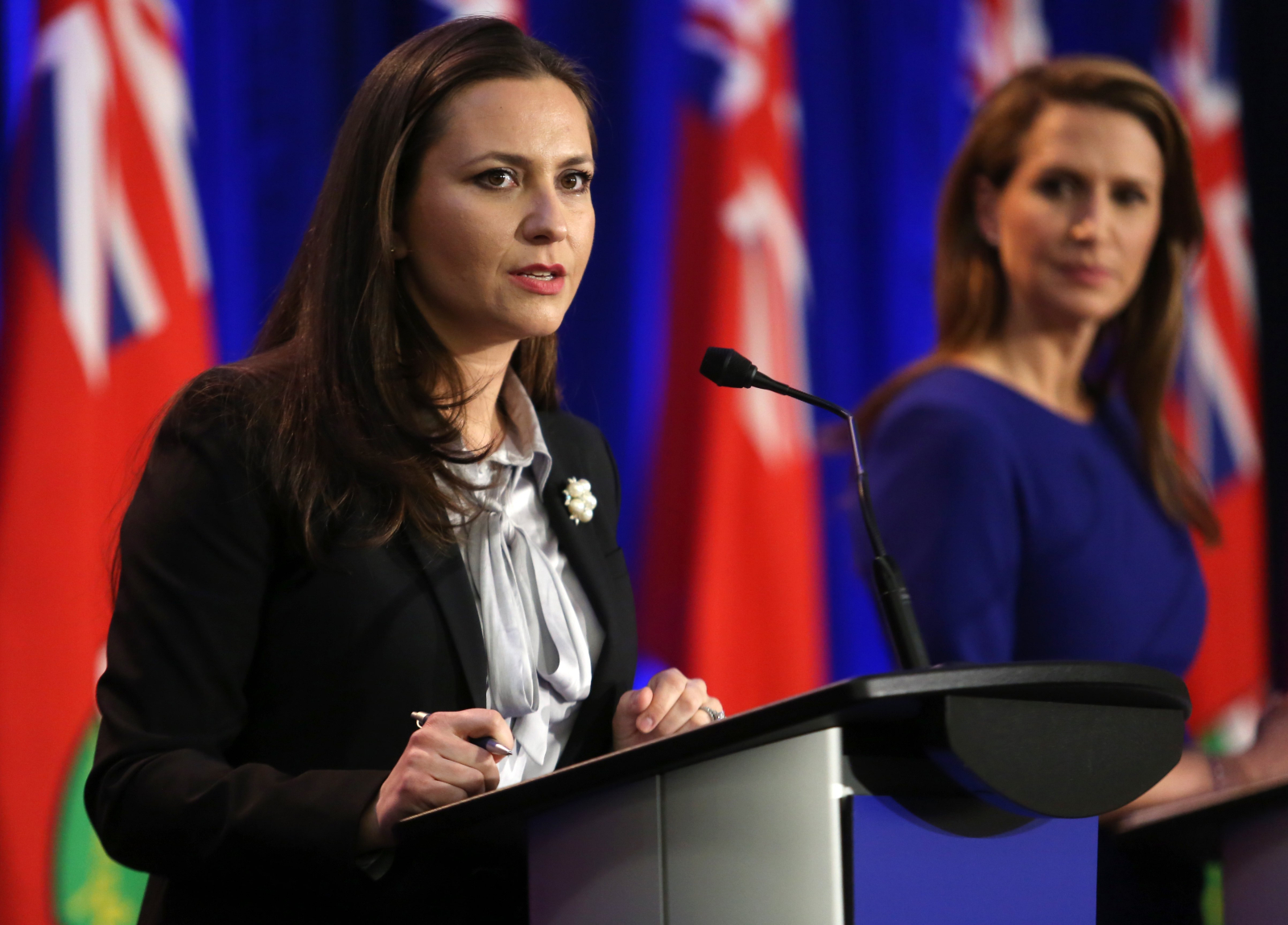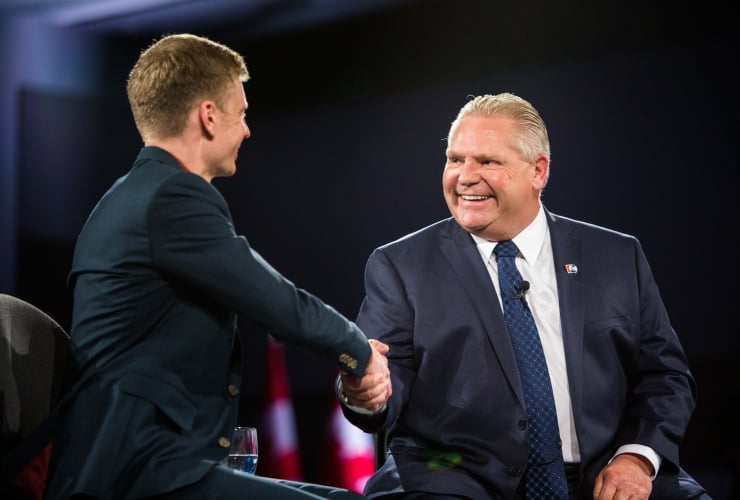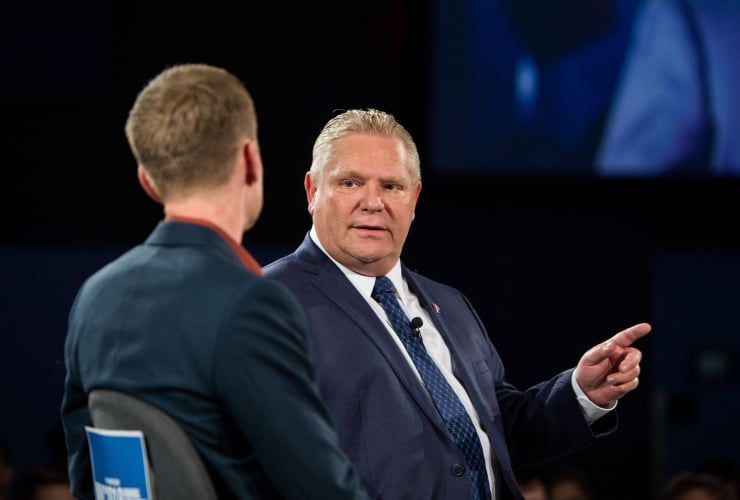If you think that a Conservative backlash against the #MeToo movement and women in politics doesn’t exist, you would be wise to pay attention to what’s happening in Ontario. In a somewhat surprising turn of events, Doug Ford just beat three well-qualified (and for the most part, experienced) women to win the Ontario Progressive Conservative leadership in a largely contested and down-to-the-wire chaotic race that had Christine Elliott winning the popular vote, but still losing the leadership campaign.
Sound familiar?
Clearly it does, as the very next day, former Toronto Star columnist and activist Desmond Cole tweeted “I don't want to wake up on June 8th and read that 53 per cent of Ontario's white women voted for Doug Ford. Y'all better come correct.”
Cole was clearly alluding to Donald Trump’s election as U.S. president, and exit polls pointing to the undeniable fact that he owed his victory to a majority percentage of white women voting for him, despite running a campaign that was heavy on sexism and derogatory comments against minorities.
Today, Ford appears to be carrying a similar formula into a new campaign as Ontarians prepare for their own general election on June 7.
I don't want to wake up on june 8th and read that 53% of ontario's white women voted for doug ford, y'all better come correct
— Negro Frolics (@DesmondCole) March 11, 2018
Religious right takes credit for Doug Ford victory
Cole wasn’t the only person voicing an opinion on Ford’s win. The next day, Campaign Life Coalition, Canada’s biggest anti-abortion organization, had issued a press release congratulating him for his win and even taking some credit. While the anti-abortion group’s number one candidate was Tanya Granic Allen, who primarily ran on a campaign to repeal and rewrite the sex education curriculum in schools, Ford was clearly their Option B.
“CLC recruited more than 9,000 PC memberships in support of Tanya Granic Allen, and we asked supporters to rank Ford #2. Their votes clearly played a large part in Doug Ford’s winning campaign,” said the press release. “We also look forward to working with Ford and reminding him to fulfill his campaign promises to repeal (Premier Kathleen) Wynne’s radical sex-ed, to defend parental rights, to support parental notification legislation for abortion, and to protect free speech and conscience rights.”
The parental notification the group references is basically legislation that would give parents the power to block a teen’s abortion. Earlier this month, during an interview with anti-abortion activists, Ford stated that he would allow members of his caucus to table and hold free votes on legislation making it harder for young women to access abortions in the province.
In an interview eerily reminiscent of Trump’s flip-flopping answers to abortion issues, Ford stated that, while he’s pro-life, he would be hesitant to re-open the abortion debate. However, he would have no issues allowing other members of his caucus to reopen it. Like Trump, Ford knows which side his bread is buttered on. Like Trump, he has courted the support of the religious right (while not as influential, Canada has those figures here too) like Charles McVety and Pastor Paul Melnichuk, who is himself a deeply controversial figure. Finding himself indebted to their support has worrisome implications for anyone invested in women’s reproductive rights and access to comprehensive sex education classes, which, by the way, have proven to decrease the exact thing the religious right considers anathema — abortions.
In a somewhat ironic twist, Doug Ford, known for uttering a string of inappropriate things and brother to the late Rob Ford, the master of inappropriate behaviour, essentially replaced Patrick Brown, a man accused of inappropriate sexual conduct by numerous women, for the party’s leadership. Ford’s return to the political limelight not only represents a growing backlash to women’s advancement, but also signals a worrisome trend of encroaching conservative populism across Canada that is most certainly not limited to that province alone.

A man of the people
And while Doug Ford isn’t exactly like Donald Trump, he shares enough similarities with the current U.S. president to merit the comparisons. Like Trump, even though he’s well off and enjoys considerable wealth, Ford fashions himself a man of the people; someone who is here to defend the average folk’s best interests, immune to backroom deals and the party establishment. Like his late brother, Ford aims to harness the same anti-establishment grievances to win this race.
It’s the kind of populism Trump ran on and garnered him large support, despite being born with a silver spoon in his mouth and having never financially struggled for anything. Ford’s “man of the people” shtick also extends to his direct use of language. Warren Kinsella is right when he recently wrote that Ford “never uses a 20-dollar word when a two-dollar word would suffice.” That appeals to a lot of voters.
Both Donald Trump and the Fords have attacked the media as untrustworthy. During an interview with Toronto Life, after the publication of his book, Doug Ford referred to the media as “a bunch of liars” that “want blood” and spoke of their “lynch mob mentality”.
Both Trump and Ford have gotten into hot water over their coarse use of language and their ability to publicly insult. As a councillor, Doug Ford had suggested that an Etobicoke home for teenagers with autism had “ruined the community” and claimed, with absolutely no evidence, that the teenagers were criminals. When the father of one of the autistic teenagers asked Ford to apologize, take some sensitivity training and resign, Ford told him to “go to hell."
The only area where Doug Ford and Trump are quite different is their stance towards immigration. While Trump has made no qualms about calling Mexicans “rapists”, wanting to build a wall, and enacting legislation to limit family reunification immigration (which he and his family have ironically benefited from in the past), Doug Ford is pro-immigration and considers them his support base.

Old boys’ club
Ultimately, Doug Ford may be his own man, but he’s made from the same cloth as men like Donald Trump. To men like that, women’s and minority rights are secondary. They don’t lose sleep over moral quandaries and everything is black and white. Nuance is something that eludes them both and what isn’t on their personal agenda can easily be pushed aside and sacrificed on the quest for political power and influence. They are both part of a dying breed; the old boys’ network of white, privileged, rich men who think they can do what they want, say what they want, when they want to. To illustrate my point, think of the mere possibility of a female candidate telling a constituent to “go to hell” and how that would go down.
Doug Ford has made it very clear that if he were American, he would have voted for Donald Trump. “Trump. Not a doubt in my mind,” he said to reporter Malcolm Johnston in 2016. “Even though he called Mexicans rapists and boasted about grabbing women—” the reporter continued. Ford went on to concede that the comments were “unacceptable” but quickly dismissed them as unimportant, revealing that he asked his wife and daughters who they would vote for and they still all replied “Trump”. How did he explain it? “Jobs and the economy trump everything else, every time.” This is clearly a man who doesn’t consider women’s issues or accusations of sexual assault or misconduct worthy of consideration in his platform – unless they can open a door for him to slip through.
During a different interview with Toronto’s City News, he pretty much gave the same answer, immediately deflecting from allegations of sexual harassment and assault against Trump and pointing to the fact that the “alternative” of “crooked Hillary Clinton” was simply not an option -- in essence, echoing Trump’s campaign messages of “anything but her”.
In the meantime, Doug Ford is geared up and ready to go and could very well be three months away from becoming Ontario’s next premier. The campaign slogan on his leadership campaign website right now? “It’s time to clean up this mess”. He’s clearly here to set things straight, clean house and make things great again. Sound familiar?
I will probably vote liberal
I will probably vote liberal in the next election. It's not only strategic voting to avoid Ford, it is also because there is not really an alternative. I have always voted NDP, but unless they come up with something that really differentiate them from the liberals, I will vote liberal. The NDP is in favour of reducing electricity tariffs. I am against that because it encourages waste. it would be better to hike rates and put policies in place to help people who have difficulty to pay, like people with low income, seniors, farmers. The NDP has to wake up if it really wants to be an alternative to the liberals. Whit a real social democrat progressive program, the NDP could end up detaining the balance of power in a liberal or (unfortunately) conservative (not progressive anymore) minority government.
I'm waiting for Ford to take
I'm waiting for Ford to take up Patrick Brown's People's Guarantee challenge. And, resign when he turns out to be no good.
Figures that Ford PCs follow
Figures that Ford PCs follow Trump's ideals, but Alberta's UCP is the one that would cause people to turn back from conservatism if elected, due to a combination of a current NDP majority and potential UCP support for military action on the pipeline. Ford couldn't even go that far.
In general, I agree with the
In general, I agree with the thrust of the article. The Conservatives will not explain the formula that they use to choose their leader. Most people would find it incredible that one candidate could win both the popular vote and a majority of ridings and still come in second.
However, I do not believe that the three women were all fit to be leaders. While I thought Caroline Mulroney was a bit inexperienced, Tanya Granic Allen was completely unfit to be a leader. Although different, her politics appeared to be as off-the-wall as Doug Ford’s. Of the four, the only one that had any characteristics of a leader was Christine Elliott. It should be noted, however, that not one of the four candidates had a clue about the serious need to slow climate change.
As for Tanya Granic Allen, she represented the very worst of so-called religious conservatism.. I think the message has to get out to these people - sex education is a public health issue and not a question of moral values. She may be against sex education and she may be against abortion and she is welcome to those views. But they are personal views and neither she nor any of her self-righteous cronies have the right to demand that society follow their whims. The fact is that when these type of so-called religious people attempt to force society to follow the rules of their particular religious cults, they are not arguing for freedom of religion, they are abusing freedom of religion and that should be brought out by the media. Unfortunately, the mainstream media doesn’t have the guts to do that. The fact is that the idea of forcing other people in society to observe the so-called beliefs of religious throwbacks is simple abuse of freedom of religion .
There is no doubt that Doug Ford would set back Ontario’s progress for decades and it is to be hoped that he doesn’t get a chance to do that.
Lew - The PCs have explained
Lew - The PCs have explained their formula. Here's a link to a CBC article that describes how it works http://www.cbc.ca/news/politics/grenier-ontario-pc-leadership-rules-1.45...
Lew - I'm also an Ontario
Lew - I'm also an Ontario resident. I'm not a PC party member, but I did keep an eye on the race and watched both televised debates. Caroline Mulroney was more than a bit inexperienced. She has never held public office and this will be the first time she has ever even run provincially. Tayna Granic Allen is a party activist, but has no experience as an MPP. There was really on one experienced candidate; Christine Elliott. As for "well qualified", once you get past the basic qualifications in the party's constitution, the rest is highly subjective. But personally I would say that experience ranks high as a qualification, which again puts the knock on Mulroney and Granic Allen. I get the feeling most PC part members felt the same way.






Comments